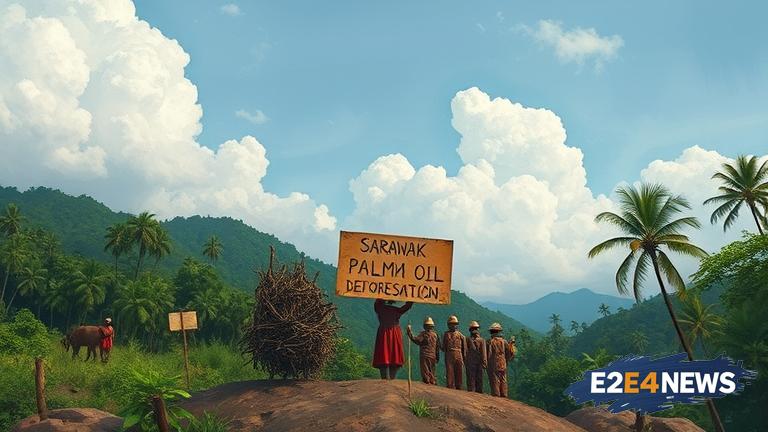The state of Sarawak in Malaysia has been plagued by rampant deforestation, largely driven by the palm oil industry. Local communities have been vocal about the need for urgent government action to address this issue, which has far-reaching consequences for the environment, biodiversity, and their very way of life. The palm oil industry has been expanding rapidly in Sarawak, with many plantations being established on land that was previously covered in lush forests. This has resulted in the loss of habitats for countless species of plants and animals, many of which are found nowhere else on Earth. The deforestation has also had a significant impact on the indigenous communities that live in the area, who rely on the forests for their livelihoods, including hunting, gathering, and farming. The communities have reported that the deforestation has led to the destruction of their ancestral lands, the loss of their traditional way of life, and the erosion of their cultural heritage. Furthermore, the deforestation has also had severe environmental consequences, including soil erosion, increased greenhouse gas emissions, and decreased water quality. The communities are calling on the government to take immediate action to address the issue, including the establishment of protected areas, the enforcement of environmental laws, and the provision of support for sustainable land-use practices. They are also seeking compensation for the losses they have suffered as a result of the deforestation. The government has been criticized for its slow response to the issue, with many arguing that it has been too lenient on the palm oil industry. The industry has been accused of prioritizing profits over people and the environment, and of ignoring the devastating impact of its activities on local communities. The issue has sparked widespread concern and outrage, with many calling for greater transparency and accountability in the industry. The communities are determined to continue their fight for justice and to protect their lands and way of life. They are being supported by environmental organizations and human rights groups, who are advocating for greater protection of the environment and the rights of indigenous communities. The issue is not only a local concern, but also has global implications, as the demand for palm oil continues to drive deforestation and habitat loss around the world. The international community is being called upon to take action to address the issue, including through the implementation of sustainable certification schemes and the promotion of responsible consumption practices. The Sarawak government has announced plans to establish a new agency to oversee the palm oil industry and to ensure that it is operating in a sustainable and responsible manner. However, the communities remain skeptical, arguing that the government has made similar promises in the past, but has failed to deliver. They are demanding concrete action and tangible results, rather than just words and promises. The issue is a complex one, involving multiple stakeholders and competing interests. However, the communities are clear that they will not back down, and will continue to fight for their rights and their environment. The fate of the forests and the future of the communities hang in the balance, and it remains to be seen whether the government will take the necessary action to address the issue. The world is watching, and the international community is waiting to see how the situation will unfold. The communities are hopeful that their voices will be heard, and that justice will be served. They are determined to protect their lands, their way of life, and their future, and they will not be silenced. The palm oil industry must be held accountable for its actions, and the government must take responsibility for its failure to regulate the industry effectively. The time for action is now, and the communities will not wait any longer for justice to be served.
